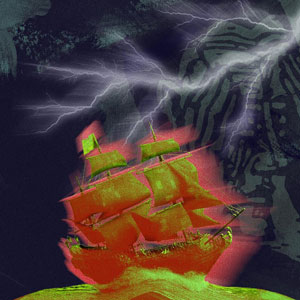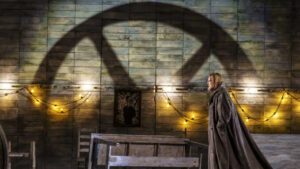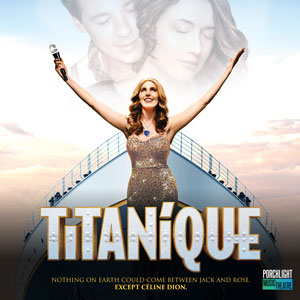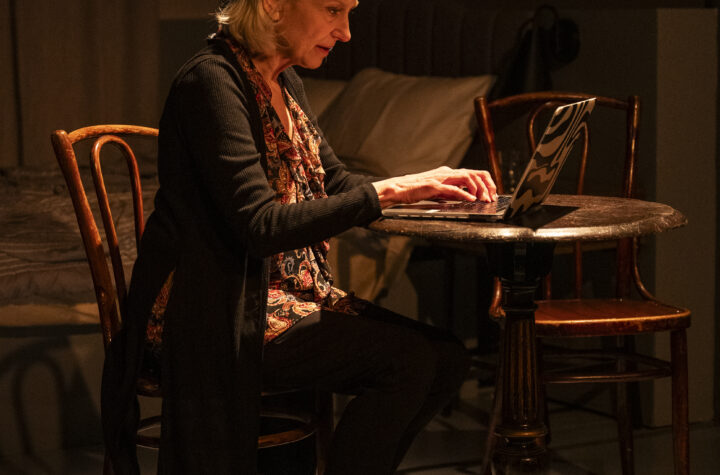
 ***** The Lyric Opera opened its new season with stormy drama. The Flying Dutchman (Der fliegende Holländer), the 1843 opera in which composer Richard Wagner first exercised his mature style, is the first Wagner to be conducted here by the new music director Enrique Mazzola, who is also starting to make the Lyric his own. Though a simple story about a tormented ghost, it codified the musical tropes that would stir and excite us to this day, and Mazzola’s leadership of the massive chorus and orchestra brings its full power and sophistication to bear. And yet this production, directed by its originator Christopher Alden, finds humor and heart in the work as well, which still has plenty to say about obsession and parasocial relationships.
***** The Lyric Opera opened its new season with stormy drama. The Flying Dutchman (Der fliegende Holländer), the 1843 opera in which composer Richard Wagner first exercised his mature style, is the first Wagner to be conducted here by the new music director Enrique Mazzola, who is also starting to make the Lyric his own. Though a simple story about a tormented ghost, it codified the musical tropes that would stir and excite us to this day, and Mazzola’s leadership of the massive chorus and orchestra brings its full power and sophistication to bear. And yet this production, directed by its originator Christopher Alden, finds humor and heart in the work as well, which still has plenty to say about obsession and parasocial relationships.
The premise of the story is that at some point in the past, the Dutchman (bass-baritone Tomasz Konieczny), was “cursed” by the devil to sail eternally in the ship that shares his name. As an equally baffling countermeasure, an angel decreed that the Dutchman would be permitted to go ashore for a single day every seven years, and if he can find a woman who will love him her whole life, he will be freed. Today the seven years are up again, and the Dutchman has piloted his ship into a small Norwegian town amid weather. While drifting toward the shore, he meets, Daland (bass Mika Kares), the captain of a local ship, whose daughter happens to be obsessed with the Dutchman’s legend. The Dutchman immediately demands to meet her, offering the vast sum of treasure he has accumulated over the years, and Daland is delighted to be paid for something that would have happened regardless. The young woman, Senta (soprano Tamara Wilson), has recently been having visions of the Dutchman, much to the annoyance of her boyfriend, Erik (tenor Robert Watson), and the entire rest of the town. The chance to be the wretched ghost’s savior is exactly the kind of importance she’s been craving in this dead-end life, and if this means her destruction, so much the better.
Gloomy and tormented, Konieczny’s massive form and instrument are the ideal manifestation of the legend come to life. His lament in his first appearance, “Die frist ist um,” is so passionate and mesmerizing that it establishes the emotional stakes for the remaining two hours. Wilson’s Senta is undeniably his equal, even as she occupies the drabness of a factory without the moody red framing lighting designer Anne Militello provides the haunted ship. Her performance seems every bit like someone who has had a dire and disturbing vision, making her compassionate for the Dutchman while being rather dour herself. The two protagonists face their fate with a determination to escape the world, but Watson’s Erik the huntsman is full of life, and just as his voice is brighter, his physical performance is energetic and, for a while, his castigation of Senta’s father makes him seem like the only sane character. Kares’s Daland, sporting a fatherly mustache and wholly oblivious to the grimness of the story he is in, is a delightful greedy buffoon with a warm voice and presence. Tenor Ryan Capozzo also gives a good show as the Steersman, a junior officer on Daland’s ship who sweetly muses on how normal ships are tossed to the arbitrary whims of the sea and sky, contrasting with how for the cursed Dutchman, the sea never changes.
emotional stakes for the remaining two hours. Wilson’s Senta is undeniably his equal, even as she occupies the drabness of a factory without the moody red framing lighting designer Anne Militello provides the haunted ship. Her performance seems every bit like someone who has had a dire and disturbing vision, making her compassionate for the Dutchman while being rather dour herself. The two protagonists face their fate with a determination to escape the world, but Watson’s Erik the huntsman is full of life, and just as his voice is brighter, his physical performance is energetic and, for a while, his castigation of Senta’s father makes him seem like the only sane character. Kares’s Daland, sporting a fatherly mustache and wholly oblivious to the grimness of the story he is in, is a delightful greedy buffoon with a warm voice and presence. Tenor Ryan Capozzo also gives a good show as the Steersman, a junior officer on Daland’s ship who sweetly muses on how normal ships are tossed to the arbitrary whims of the sea and sky, contrasting with how for the cursed Dutchman, the sea never changes.
It’s a plot point that Senta has painted her vision of the Dutchman, and director Christopher Alden notes that he and costume and set designer Allen Moyer decided to make the painting in the style of what the nazis called “degenerate art.” As a critique of Wagner’s anti-Semitism, that strikes me as extremely subtle, as are attempts to reference that in the work of literature Wagner was adapting, the Dutchman is explicitly compared to the Wandering Jew. Wagner, however, gives the Dutchman a hunting horn leitmotif, which the director uses to further aggravate Erik’s jealousy, and very late in the play the Dutchman reveals something about the nature of his curse that causes us to significantly reevaluate our opinion of him and who the curse is actually meant to harm. Sticking to a minimalist but imposing set, Alden mostly focuses on the emotional beats, allowing our imaginations to fill in the scene. Another wise bit of restraint is keeping the ghost crew chorus invisible during their big song at the wedding when they cheer on their dreaded captain, creating one of the most arresting moments I’ve experienced at the opera. Although the length of a typical modern musical at two hours and twenty minutes, this production is performed without an intermission so as not to break the atmosphere, and as a piece that’s all about atmosphere, it delivers. Senta’s fixation on the Dutchman resembles obsession with a celebrity, but it could also represent anyone who is desperate to latch on to some sort of grand purpose as an excuse for abandoning their life. Visitors to the Lyric this fall will start Halloween season in a manner that will be hard for the rest of the month to top, but like all great horror stories, this one uses a great deal of style to probe at deeper fears.
The Flying Dutchman will continue at the Lyric Opera House, 20 N Upper Wacker Drive, Chicago, thru October 7, with the following showtimes:

October 1: 2:00 pm
October 4: 2:00 pm
October 7: 7:30 pm
Running time is two hours and twenty minutes with no intermission. There is also a thirty-minute preview talk an hour before the show.
Performances are in German with English supertitles.
Ticket prices vary. The Lyric offers parking deals with Poetry Garage at 201 W Madison St. if inquired about in advance. To order, visit LyricOpera.org or call 321-827-5600.
To see what others are saying, visit www.theatreinchicago.com, go to Review Round-Up and click “The Flying Dutchman.”





More Stories
“Titanique”
“Sunny Afternoon” reviewed by Carol Moore
“No Such Thing”